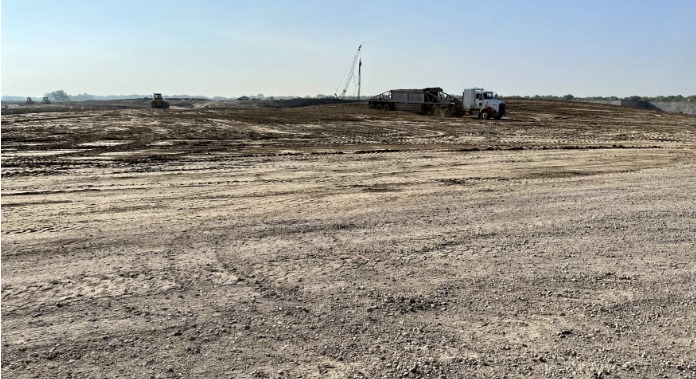By Elizabeth Rembert
A highly concentrated beef market has meant higher prices for consumers and lower returns for the people raising the animals. Some ranchers in the Midwest and Great Plains want a new option by organizing their own processing plants.
A crane looms above a dusty field just outside of North Platte, Nebraska, where trucks loaded with dirt criss-cross the busy site and workers set up a foundation. Two years ago, an old sewer lagoon took up this stretch of land. Cattails and marshy soil made the field a swampy mess.
Today, it’s the future site of Sustainable Beef, a meatpacking plant that Nebraska ranchers and cattle feeders began planning in 2020.
Sustainable Beef is one of a few projects across the Midwest and Great Plains, where local producers came together to organize their own meat processing facilities in a bid to break away from the four massive companies that dominate the beef market.
Ranchers in Missouri, South Dakota and Iowa are also organizing plants, like the Cattlemen's Heritage Beef Company near Council Bluffs, Iowa.

The construction site is just outside of North Platte, Nebraska. It was previously an old sewer lagoon, complete with marshy soil and cattails.
In Nebraska, Sustainable Beef CEO David Briggs said he expects the facility to be up and running in 2025. When the plant is fully operational, it will process around 1,500 cattle a day. That’s roughly 1.5% of the nation’s capacity, according to Briggs.
“Our mission was not to just be a local or to take care of one community,” he said. “It was to help with the national security concept, and actually be a player in the overall industry.”
The cattle business has become increasingly challenging for ranchers and cattle feeders, as processing companies like Tyson, JBS, Cargill and National Beef have gotten bigger. Today, four companies control around 85% of the beef market.
That’s left fewer buyers and forced ranchers to take lower prices when they sell their animals to be turned into steaks, even as grocery shoppers pay more for those cuts.
The packers have been hanging onto large profits. But this group of Nebraska ranchers and feeders want another option. Modeled after a co-op business, they are establishing their own plant where they can process their own animals.
Keeping money in cattle country
Sustainable Beef represents a bid at stopping the flow of money toward corporate bank accounts, instead putting it in local cattlemen’s pockets, like board member and founder Trey Wasserburger.
Wasserburger works alongside his father-in-law Kirk Olson at Olson Farms, a feed yard west of North Platte. He looks out over one of the feedlot’s pens, where cattle crowd close to the edges to push their heads through a fence and get to the golden grains in a feed trough.
“These will probably be ready to go here in the next 30 or 40 days,” Wasserburger said. “They'll go to a large packer and they'll be in the beef supply chain in 60 days, probably.”
It takes three years of hard work to even get the cattle to this point, he said. Now they need twice-daily feedings, regular cleaning and constant health checks.
Cassie Lapaseotes – another Sustainable Beef board member and founder – runs a feed yard with her family in far western Nebraska. She said it’s sort of like a hotel model.
“Before you go to a hotel, you want clean sheets and everything ready for you to come in,” Lapaseotes said. “When these cattle come into a feed yard, we want their pens to be clean, their water tanks to be clean, the feed to be freshly laid out in front of them.”
Click here to see more...